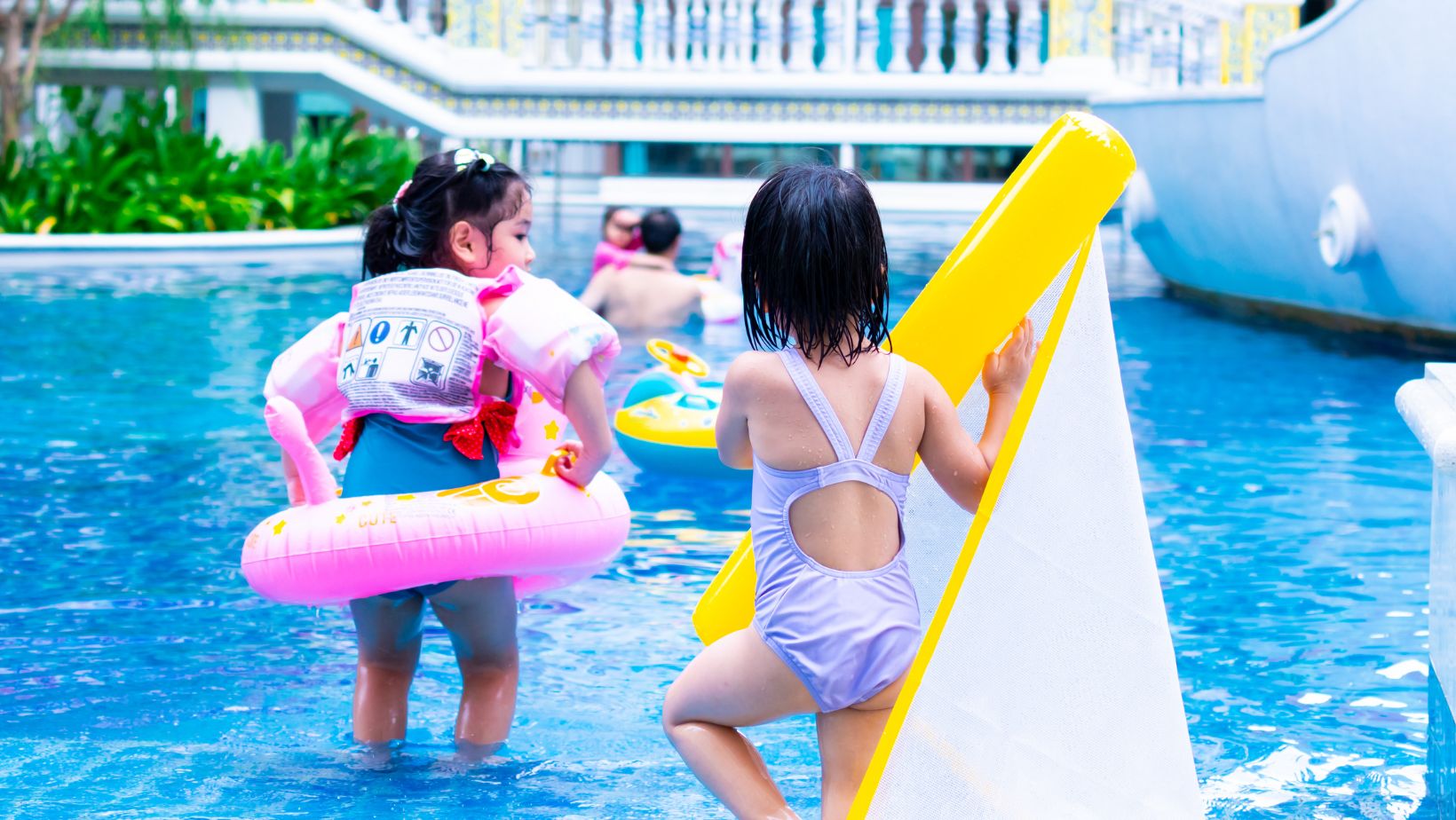Planning a family trip to Great Wolf Lodge? Water parks offer incredible fun and lasting memories, but your family’s safety should be your top priority. Recent data shows that over 4,500 people die from drowning each year in the United States, with drowning being the leading cause of death for children ages 1-4. Don’t let these statistics alarm you—instead, let them motivate you to be prepared. With the right knowledge and precautions, your water park adventure can be both thrilling and safe.
Table of Contents
ToggleThe Reality of Water Park Safety
Water parks present unique challenges that differ from your backyard pool or local beach. Water parks are not federally-regulated for safety – they rely on states to regulate, which means that some water parks have little-to-no safety oversight. This makes your role as a parent even more critical.
Most accidents at water parks involve slip and fall injuries on wet surfaces, and waterslide injuries. However, the most serious concern remains drowning prevention. The CDC reports that 80% of child drownings happen in a residential pool while an adult was present, highlighting that proximity doesn’t guarantee safety—active supervision does.
Essential Pre-Visit Preparation
Swimming Skills Are Non-Negotiable
Before you step foot in any water park, assess your family’s swimming abilities honestly. Formal swimming lessons can reduce the risk of drowning, and recent CDC data reveals alarming gaps in basic water skills. Over half (55%) of U.S. adults have never taken a swimming lesson, with even larger disparities among certain communities.
If your children aren’t strong swimmers, enroll them in lessons well before your trip. Remember that even children who have completed swimming lessons still need constant supervision in water park environments.
Life Jacket Requirements
Great Wolf Lodge requires guests less than 48 inches tall, weak swimmers and non-swimmers to wear a lifejacket. The good news? Many water parks provide them free upon request. However, you should bring Coast Guard-approved life jackets that fit your children properly.
Critical safety note: Do not use air-filled swimming aids (such as “water wings”) in place of life jackets or life preservers with children. Using air-filled swimming aids can give parents and children a false sense of security.
Understanding Great Wolf Lodge’s Safety Protocols
Great Wolf Lodge takes safety seriously, but parents must understand their responsibilities. Parents: Your child’s safety is a shared responsibility, as stated clearly in their safety rules. The resort partners with Jeff Ellis & Associates (E&A), a private, outside consulting firm specializing in aquatic risk management.
Height and Health Requirements
Waterslides are high-thrill rides. Riders will experience steep declines, inclines, changing directions and high speed. Every attraction has specific requirements, and all height requirements for the various water slides and features at Great Wolf are carved in stone. Staff will turn away children who don’t meet requirements, even if they try to use “tippy-toes.”
Before riding any attraction, you should be in good health to ride. Only you know your physical conditions or limitations. If you suspect your health could be at risk or you could aggravate a pre-existing condition, PLEASE DO NOT PARTICIPATE!
Active Supervision Strategies
The Water Watcher System
Designate a Water Watcher: Adult supervision is the number one way to prevent drowning. Never leave a child unattended in or near water and always designate a Water Watcher. This means one adult focuses solely on watching children in the water—no phone calls, no reading, no distractions.
Recognizing Drowning Behaviors
Contrary to popular belief, drowning is fast and silent. It can happen in as little as 20-60 seconds and in as little as 2 inches of water. Drowning doesn’t always involve splashing or calling for help. Watch for:
- Silent struggling in the water
- Head tilted back with mouth open
- Eyes closed or unfocused
- Vertical body position without leg movement
- Gasping or hyperventilating
Age-Appropriate Zones
Keep younger children and toddlers in the shallow play areas. Most water parks have zero-depth entry pool with sprays, fountains, and water games that may be better suited for your younger children. If your younger child is near older kids who are splashing a lot in the water, move with your child to a quieter, safer area.
Physical Safety Precautions
Proper Attire and Sun Protection
Choose appropriate swimwear carefully. Avoid swimsuits that have exposed metal or hard plastic rivets, zippers, buttons or decoration. These items can scratch the surface of the slide and that can create an injury for a future rider, as well as become potential hazards, and get caught on the slide or attraction.
Your child should wear a brightly colored swimsuit (such as neon pink or green) so you or a lifeguard can easily spot them.
Don’t forget sun safety: Apply waterproof sunscreen 30 minutes before you arrive at the park and reapply it throughout the day. Waterproof sunscreen needs to be reapplied every 80 minutes if you’ve been in the water.
Hydration and Rest Management
Stay hydrated. Even though the children will probably beg for it, try to keep them away from sugary drinks like soda or juice. These drinks can often lead to dehydration. There are some “toos” that can quickly turn to dangerous circumstances if not monitored correctly. Don’t get too tired, too cold, too far from safety, or too exposed to sun.
Understanding Recent Safety Incidents
While Great Wolf Lodge maintains strong safety protocols, recent incidents remind us to stay vigilant. In August 2024, 16 people were hospitalized at the Great Wolf Lodge in Webster, Texas after a contractor improperly mixed pool chemicals, causing a chemical reaction. While this incident occurred in an isolated building separate from the hotel and water park and didn’t affect guests, it underscores the importance of proper safety protocols.
For families concerned about safety incidents or seeking legal guidance, a Great Wolf Lodge lawsuit may be necessary in cases of negligence or inadequate safety measures.
Emergency Preparedness
Know the Layout
Like visits to amusement parks and attractions designating a meeting place is always smart in the instance someone is separated from your party. Find first aid stations: It’s smart to know where first aid stations are located in case of an emergency.
CPR Skills Save Lives
Your CPR skills could save someone’s life in the time it takes for paramedics to arrive. Consider taking a CPR class before your family vacation—it’s one of the best investments you can make in your family’s safety.
The Buddy System
Use the buddy system. When possible, each child should have a buddy to stay with for the day. This creates an additional layer of accountability and helps ensure no child is left alone.
Health and Hygiene Considerations
Water parks present unique health challenges beyond drowning prevention. The Centers for Disease Control (CDC) in the U.S. recommends all swimmers be vigilant in following three basic guidelines to prevent disease transmission: Do not swim if you have diarrhea. This is especially important for children in diapers. Do not swallow the pool water. Try to avoid getting water in your mouth if possible. Practice good hygiene and shower before swimming.
Great Wolf Lodge requires that diaper wearing guests must wear a protective swim diaper and asks parents to take your children to the restroom often.
Special Considerations for High-Risk Groups
Children with Medical Conditions
People with seizure disorders such as epilepsy are at a higher risk of fatal and nonfatal drowning than the general population. If your child has any medical condition that could increase drowning risk, have one-on-one supervision around water.
Swimming Skill Disparities
Recent CDC data reveals concerning gaps in swimming ability across different communities. More than 1 in 3 Black adults (37%) reported not knowing how to swim compared to 15% of all adults. These disparities make swimming lessons even more critical for families from underserved communities.
Rules and Regulations Matter
Most water parks post descriptions of rides online, on the park map and at the entrance to each attraction. Review that information to understand the nature and thrill-level of the ride as well as any swimming-level requirements, age, height, weight or health restrictions.
All water parks post their rules to keep you safe. Read these signs, talk about them with your child, and let them know the rules are there for their safety. Common rules include walking instead of running and following proper slide positions.
The Role of Lifeguards
While Great Wolf Lodge employs numerous trained lifeguards, remember that lifeguards are just one layer of protection to prevent drownings. You still need to watch your children. The lifeguards, though great, are not meant to take the place of a parent.
It is always best to swim in an area supervised by lifeguards, but remember, lifeguards are the last line of defense when all other layers of protection fail.
Creating Your Family Safety Plan
Before your Great Wolf Lodge visit, create a comprehensive safety plan:
- Assess swimming abilities for every family member
- Review attraction requirements online before arrival
- Pack appropriate safety gear including Coast Guard-approved life jackets
- Designate water watchers for each swimming session
- Establish meeting points in case of separation
- Identify emergency resources including first aid stations
- Discuss rules and expectations with children before entering the water park
Bottom Line
Water park safety requires active, engaged parenting combined with proper preparation and equipment. While the statistics on drowning can seem frightening, remember that all drownings are preventable when families take appropriate precautions.
Great Wolf Lodge provides many safety resources and protocols, but your vigilance as a parent remains the most important factor in keeping your family safe. With proper preparation, constant supervision, and adherence to safety rules, your family can create wonderful memories while staying safe in the water.
The key is treating water park safety as seriously as you would any other potentially dangerous activity—because when it comes to water safety, there’s no such thing as being too careful. Your children’s lives may depend on the preparations you make today.






